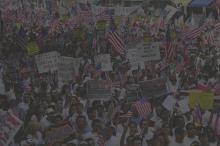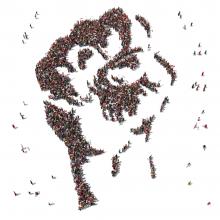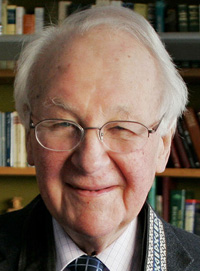Resistance

I fear now, as I have feared for months, the impact of his presidency on vulnerable people — including the white and working-class voters in places like my home state of Ohio who lent him their support.
Christians always have disagreements about policy proposals or party platforms during election seasons. But this year, I wonder how white Christians who read the same Scriptures and hold many of the same beliefs that I do could support a man who in word and deed has flaunted the core teachings of our faith.

While I mourn how this election threatens to erode the progress that’s been made over the last eight years, I am reminded this is not our whole story as a nation nor as citizens of the kin-dom of God. There is a better story yet to be written.
Storytelling is at the heart of all movements. If we have ears to hear and eyes to see, stories can inspire us to listen deeply and to compassionately respond to the voices and lived experiences of those on the margins of society.

On their first day in office, newly elected members of the U.S. House of Representatives take an oath on the House floor — to “support and defend the Constitution of the United States.”
But before his election as Speaker of the House, Rep. Paul Ryan took another oath — this time to the so-called “Freedom Caucus,” a group of several dozen overwhelmingly white, conservative Congressmen from overwhelmingly white, conservative congressional districts.
Specifically, reports the National Review, the oath “extracts Ryan’s word that he will not bring up comprehensive immigration reform ‘so long as Barack Obama is president’ and, as speaker, even in the future, Ryan will not allow any immigration bill to reach the floor for a vote unless a ‘majority’ of GOP members support it.”
In short, in order to become the new speaker of the House, Ryan has vowed to block immigration reform from coming to a vote until January 2017 — at the earliest.
This is the second time Ryan has made a pledge on immigration reform. I remember the first: in 2014, Ryan called me at the Sojourners office, offering to help Christians pass comprehensive immigration reform. That led to meetings in Ryan’s office with key evangelical leaders about how to do that strategically, with Ryan telling us that the “evangelical factor” on immigration reform was something he had never seen before.
He promised us on several occasions that he would help bring immigration reform bills to the floor of the House. Many other Republicans promised the same thing to evangelical pastors who came to visit them from their districts.

When stories of human trafficking or dramatic rescue operations come across our news feeds, we are understandably shocked. For a moment, our attention is grabbed and we feel genuine outrage toward the traffickers and, hopefully, compassion for the trafficked persons. But to what end?
Sadly, the underground and criminal nature of human trafficking helps to keep the stark realities out of sight and, consequently, out of the minds of most people. When we do think of human trafficking, it tends to be as something that happens “over there” or in seedy brothels. It is somehow easier to blame the bad actors, pimps, traffickers, and sweatshop managers rather than recognize the multiple ways that we are connected to human trafficking through our everyday actions. Because we are, in fact, connected. As Pope Francis observed in his apostolic exhortation, Evangelii Gaudium: “There is greater complicity than we think. The issue [modern slavery] involves everyone!”
Human trafficking is present in virtually every human community. Moreover, because the majority of people held in slavery today are forced to work in agriculture and mining, it is inevitable that products make it into the supply chain and our shopping carts. Sex trafficking also does not happen in a vacuum, but rather in a social context which tolerates, and even normalizes, sexual exploiation and the commodification of the human person.
Surely there is a mine for silver, and a place for gold to be refined ... They put their hand to the flinty rock, and overturn mountains by the roots. They cut out channels in the rocks, and their eyes see every precious thing ... But where shall wisdom be found? —Job 28:1, 9-12
THE DIRT ROAD twists down into a gully at La Puya, Guatemala, and up the other side, slipping between the knee-high fields of holy corn. The river doesn’t run anymore at the bottom, but the butterflies gather in remembrance of the water of times past. Hundreds of them rest and then flutter suddenly up as a woman goes by to gather fresh basil or chipilin from the little herb and vegetable garden that grows in tires and the ground all along the blocked access road leading into the proposed gold-mine site.
La Puya is the curve in the road where a thorn tree used to stand, throwing fine sharp needles down on unsuspecting passersby. Now it is a well-ordered encampment of neighbors from the twin municipalities of San Pedro Ayampúc and San José del Golfo, 10 miles northwest of Guatemala City.
These women and men are here in a startling act of markedly Christian peaceable resistance. They have been at the gates around the clock and around the calendar since March 2, 2012, when a lone woman pulled her car across the access road to the mine, blocking some incoming machinery. Then a bus bumping down the main road stopped, and the passengers piled off when they saw what was happening.
Then more people came, and dozens stayed. They settled in for a long night that became a long season of resistance. Local communities had had enough of the obfuscation, lies, and manipulation from Radius Gold, a mining company based in Vancouver, Canada.
What a relief it would be to dwell in [faith] communities where we acknowledge our shadows in a healthy acceptance of ourselves as containers of all the opposites! It may prove beneficial to be forced to face, daily, the humiliating fact that some of us are no less violent than those whose policies we oppose.
—Walter Wink, Engaging the Powers
I AM A conscientious objector, and I am drawn to violence. My attraction to violence is both innate and learned. When something frightens me, my hands clench into fists. When something angers me, I want to inflict pain upon that thing. But a person cannot inflict pain upon a thing, so I seek out those whom I deem responsible for said thing and my desire to inflict pain upon a thing morphs into a desire to do violence to another person. Since I was a child, I have fantasized about using violence to stop what I see as bad and thereby become good.
It is from this point—from these fantasies of righteous violence—that I begin this essay on my journey to principled nonviolence and conscientious objection. This is a story of change and choice, but it is not a story of transformation: I am who I have always been.
In fall 2012, I spent three weeks in Israeli military prison for refusing to enlist in the Israel Defense Forces. (Every Israeli citizen, except for the ultra-Orthodox and Palestinian citizens of Israel, must serve in the military.) My sentence was brief, but the process that brought me to the prison’s gates took almost a decade.
NO ORDINARY MEN: Dietrich Bonhoeffer and Hans von Dohnanyi, Resisters Against Hitler in Church and State is a tightly woven story framed by the sophisticated historical analysis of its two authors, former senior Farrar, Straus, and Giroux editor Elisabeth Sifton (daughter of theologian Reinhold Niebuhr) and Columbia University professor emeritus Fritz Stern, a famed German scholar. The book profiles two brave young men—Bonhoeffer, a theologian and minister deeply involved in fighting the Nazis’ efforts to control the German Protestant churches, and Dohnanyi, a brilliant lawyer (son of Hungarian composer Ernst Dohnanyi) working in the German Ministry of Justice, who used his key position to methodically collect evidence against the Nazi regime.
Sifton and Stern portray Dohnanyi in detail as a leader in the small but high-powered German resistance movement. Brig. Gen. Hans Oster, a resistance member, hired Dohnanyi away from the Ministry of Justice ostensibly to help run the Abwehr, a German military intelligence organization that was also the center of the anti-Hitler resistance, in 1939. Dietrich Bonhoeffer was then recruited by Dohnanyi to be part of this team. Dohnanyi’s wife, Christine (Bonhoeffer’s sister), is also revealed as a significant influence on and aide to her husband.
The slim, 157-page volume is an important new historical work in the growing field of research on the German resistance movement during World War II. It is a penetrating look at Dohnanyi’s dangerous operations against the Nazis with historical perspective that other books on him and Bonhoeffer lack. Earlier biographies, written mainly by church people, more or less emphasized Bonheoffer as a singular hero fighting Hitler. Bonhoeffer was indeed very brave and traveled thousands of miles abroad while working as an agent for the Abwehr, but he was just one of a circle of resisters.
Could nonviolent resistance have succeeded in Libya? Here are four points worth considering:
1) The movement was fairly spontaneous, unlike the highly coordinated campaign in Egypt. As Peter Ackerman consistently points out, planning is an essential element to a successful nonviolent revolution. As with any battlefield, a nonviolent campaign requires extensive preparation. But reports seem to indicate that Libyans began protesting in earnest around Feburary 15th, likely inspired by events in neighboring Egypt and Tunisia. Gadhafi seemed prepared for this and immediately cracked down using overwhelming violence. By February 19th, the movement had become violent in response to these crackdowns. Four days of civil resistance doesn't give it much time to work. Egyptian pro-democracy activists struggled for years before seeing Mubarak fall. Syrian oppositionists, thousands of whom have been killed by Bashar al-Assad's regime, have toiled along for the past six months. So, we can't really say whether or not nonviolence would have worked in Libya. It never had a chance to materialize in the first place.
More than 150 Roman Catholic priests in the United States have signed a statement in support of a fellow cleric Roy Bourgeois, who faces dismissal for participating in a ceremony ordaining a woman as a Catholic priest, in defiance of church teaching.
More than 300 priests and deacons in Austria -- representing 15 percent of Catholic clerics in that country -- last month issued a "Call to Disobedience," which stunned their bishops with a seven-point pledge that includes actively promoting priesthood for women and married men, and reciting a public prayer for "church reform" in every Mass.
 [Editors' note: Rev. John Stott, one of the world's most influential evangelical figures over the past half-century, died this Wednesday at age 90. Rev. Stott served as a contributing editor for Sojourners magazine, when we were known as The Post American, and wrote this article for the November/December, 1973 issue of the magazine. We will always remember Rev. Stott for his profound contributions to our community and the Church.]
[Editors' note: Rev. John Stott, one of the world's most influential evangelical figures over the past half-century, died this Wednesday at age 90. Rev. Stott served as a contributing editor for Sojourners magazine, when we were known as The Post American, and wrote this article for the November/December, 1973 issue of the magazine. We will always remember Rev. Stott for his profound contributions to our community and the Church.]
It seems to be a characteristic of the Anglo-Saxon mind to enjoy inhabiting the "polar regions" of truth. If we could straddle both poles simultaneously, we would exhibit a healthy balance. Instead, we tend to "polarize". We push some of our brothers to one pole, while keeping the other as our own preserve.
What I am thinking of now is not so much questions of theology as questions of temperament, and in particular the tension between the "conservative" and the "radical."

This comes after a Supreme Court decision in May that ordered California to reduce its prison population, as overcrowding was causing "needless suffering and death."
Part of what's making the standoff worse is the belief that the strike is, in essence, a form of gang activity. For one thing, as Colin Dayan noted in passing in a New York Times op-ed, "How they have managed to communicate with each other is anyone's guess." The California Department of Corrections and Rehabilitation (CDCR), though, isn't so stumped.
Hundreds of miners, activists, students, academics, environmentalists, and other citizens are marching to West Virginia's historic Blair Mountain in an effort to save it from mountaintop removal.
Erica Chenoweth directs Wesleyan University's program on terrorism and insurgency research, which she established in 2008. Her work will be featured in the upcoming May issue of Sojourners magazine. Erica is doing innovative research on the strategic effectiveness of civil resistance and nonviolent revolution. Recently, she wrote a post at Monkey Cage on why traditional "peace and security" academic programs should include nonviolence and civil resistance tactics as part of their programs. "It is time for security studies to take nonviolent conflict seriously," writes Chenoweth, "and to incorporate such episodes and their dynamics into the canonical literature."
In recent weeks, Facebook and other social media have clearly demonstrated their capacity to do far more than just allow us to keep in touch with our family and friends. They have proven to be powerful organizing tools, capable of assisting in the creation of broad international movements for social change. Social media has proven to be a particularly powerful tool in countries in which basic democratic rights such as a free press and the right to assembly are severely restricted. At the same time, Facebook and YouTube are increasingly rendering international borders as meaningless. Western media coverage of the recent popular uprising in Egypt consistently emphasized the catalytic role of Facebook in galvanizing youth and young adults to take action against an entrenched regime that had long been viewed as impenetrable. In the days after Mubarak's departure, both the New York Times and The Los Angeles Times published lead stories describing the role of certain Facebook pages in not only serving as a call to action, but as a space in which emerging activists in Tunisia and Egypt were able to share lessons with each other. These young activists had not only managed to evade the reach of both nations' security police, they had also sidelined older opposition parties such as the Muslim Brotherhood in Egypt.